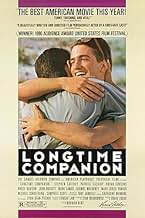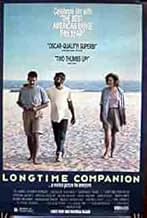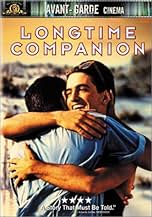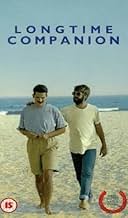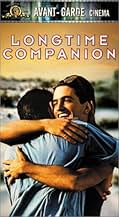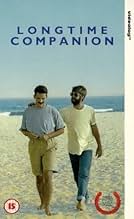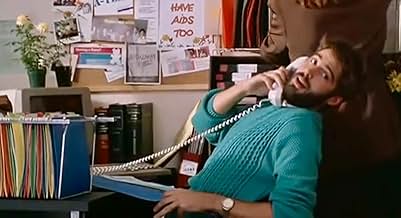VALUTAZIONE IMDb
7,5/10
6383
LA TUA VALUTAZIONE
L'emergere e la devastazione dell'epidemia di AIDS è cronaca nella vita di diversi uomini gay che hanno vissuto durante gli anni '80.L'emergere e la devastazione dell'epidemia di AIDS è cronaca nella vita di diversi uomini gay che hanno vissuto durante gli anni '80.L'emergere e la devastazione dell'epidemia di AIDS è cronaca nella vita di diversi uomini gay che hanno vissuto durante gli anni '80.
- Regia
- Sceneggiatura
- Star
- Candidato a 1 Oscar
- 6 vittorie e 6 candidature totali
Recensioni in evidenza
Following in the footsteps of AN EARLY FROST, here is yet another film with an AIDS theme to reckon with. Unlike FORST [which actually dealt with a gay couple and their parents] this deals with the gay community and several lover relationships. What I like about this film, and I did like FROST, was the honesty in telling the story of relationships. We are introduced to a group of gay friends and their mates, who spend much time together in vacationing on Fire Island, the gay resort, and in the hospital visitng each other when stricken with the unknown disease that has become a plague amongst us today. The actors brought their own individual depth to each character. I couldn't find a bad performance in the lot. Notably Bruce Davison stands out. He brings such an understanding and compassion to his work. You really believe him as he becomes his partner's companion in the last days of his life. The scene when he tells him it's okay to leave, was awesome. How can you separate the good actors from acknowledgement. Campbell Scott and Stephen Caffrey, Patrick Cassidy [and that famous kissing scene on the soap he was acting in] gave such a wonderful scene when he's in his lover's hospital room and begins to break down. The face of his lover as he listens to him cry broke my heart. John Dossett, Mark Lamos and Dermot Mulroney [and I'm not sure what actor played what role] all gave so much honesty to their work. A great ensemble of players, a delicate and honest script about a controversial disease that has by this time taken the lives of millions of young people [gay and straight], excellent direction and well photographed, I highly recommend this to everybody to see. You'll come away with a different attitude about not only gay life, but the killing disease.
Longtime Companion chronicles the lives of a group of gay men during the 1980s. The focus of the film is AIDS, unknown to the men when the film opens in 1981, but by the end of the story in 1989, it has become the central defining event in the lives of the survivors. Shot in almost documentary style the story is told almost matter-of-factly. But the reality of the lives of the men in the story is not matter-of-fact; they are dying and dying in the prime of their lives. It's heart-rending. In this, the movie succeeds very well, raising awareness of the effects of AIDS, and putting a human face to its victims.
Blondie's hit record opens this early AIDS film, a kneejerk reaction to the hysteria that was happening in the world in the wake of so many deaths from what was still viewed as 'the gay plague'.
'Longtime Companion' centres on a group of friends who are affected by AIDS in various different ways - two are victims of the disease, while others survive to remember their friends with affection. There are one or two stereotypes here (the camp Fuzzy, who mimes to disco records), but in the main the characters are played with sensitivity (and a degree of humour): Bruce Davison, Mark Lamos, and Campbell Scott stand out from a good cast.
I particularly liked the moving and celebratory ending, a surreal segue which brings everyone together in a huge, joyous beach party where everyone is alive, in love, and together. This single scene says more about the effects of the AIDS epidemic than many other right-on scenes from more traditional films.
'Longtime Companion' centres on a group of friends who are affected by AIDS in various different ways - two are victims of the disease, while others survive to remember their friends with affection. There are one or two stereotypes here (the camp Fuzzy, who mimes to disco records), but in the main the characters are played with sensitivity (and a degree of humour): Bruce Davison, Mark Lamos, and Campbell Scott stand out from a good cast.
I particularly liked the moving and celebratory ending, a surreal segue which brings everyone together in a huge, joyous beach party where everyone is alive, in love, and together. This single scene says more about the effects of the AIDS epidemic than many other right-on scenes from more traditional films.
The title is the newspaper obituary euphemism for a gay lover, and yet another discreet but frustrating reminder of how mainstream heterosexual society avoids confronting the AIDS epidemic. In an effort perhaps to offset public ignorance, Norman René's film of the same name almost resembles an AIDS awareness primer, dramatizing the deadly progress of the disease through the gay community since the summer of 1981, when 'safe sex' merely meant anything goes, but don't get caught. Like other American Playhouse productions the film is simple, unpretentious, and no less rewarding for being so straightforward. René and writer Craig Lucas have wisely resisted the temptation to make a 'Love Story'-style terminal illness melodrama, concentrating instead on the bittersweet pain and bravery of awkward hospital visitations and quiet deathbed encounters. Only the forced optimism of the final daydream rings false, unavoidably since the epidemic itself (still) has yet to be resolved by anything resembling a cure. The balance of the film is simply too honest to support such sentimental wish-fulfillment fantasies.
When I watched this for the first time, I like many that went through this time period, identified with most of the characters in this movie at one time or another. I had my sister watch this movie (a devoted Pentecostal) she said it was the sadist thing she had ever seen. I felt that she got the message, Gay or Straight, this was a tragedy that had happened to everyday people, and still is happening, and not just to "those people". She, like many, never wanted to see past the homosexual thing. With this film she saw a clip of life, albeit a condensed version, of how something so out of control entered, affected and was handled by people like herself both gay and straight. I told her that was the way it I felt it was for many of us dealing with this disease that had taken so many of my friends and colleagues. I also liked how this movie didn't victimize, or make a villain out of any of the characters nor did it make anyone a saint either. I felt the topic was handled with good taste, considering how it was something most people didn't want to think about. With the majority of the audience being straight and secure in the fact that this only happened to other people who were deserving of what they got. I also felt that this movie showed the truth although a bit Hollywood and too polished (not a docudrama, definitely a movie) it did a good job of making a difficult subject much more palatable and sympathetic to folks that had never had it happen to them or to those they love. The progression of the movie conveyed the feeling most had in regards to how fast things happened. One day someone was here the next they were gone. I also felt that the actors, many non gay, did brilliant performances not playing stereotype's but keeping it real as it should be. Since most gay men and women I know don't act all that different from everyone else. I for one am tired of gays being portrayed as only hair stylist and drag queens, much as I am sure African-Americans were tired of their stereotypes of only being the hired help or as ignorant simpletons. This was not the best movie I have ever seen, but I feel it is one of the best dealing with this subject matter. The end of this movie still gets to me, every time I see it, if only that could happen like that, I too "just want to be there"
Lo sapevi?
- QuizThe title refers to the only way that newspapers at the time would allow a gay man's lover to be listed in an obituary.
I più visti
Accedi per valutare e creare un elenco di titoli salvati per ottenere consigli personalizzati
Dettagli
- Data di uscita
- Paese di origine
- Lingua
- Celebre anche come
- Longtime Companion
- Luoghi delle riprese
- Aziende produttrici
- Vedi altri crediti dell’azienda su IMDbPro
Botteghino
- Budget
- 3.000.000 USD (previsto)
- Lordo Stati Uniti e Canada
- 4.609.953 USD
- Fine settimana di apertura Stati Uniti e Canada
- 50.525 USD
- 13 mag 1990
- Lordo in tutto il mondo
- 4.609.953 USD
Contribuisci a questa pagina
Suggerisci una modifica o aggiungi i contenuti mancanti

Divario superiore
By what name was Che mi dici di Willy? (1989) officially released in India in English?
Rispondi


